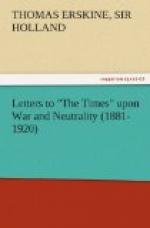In my last annual message I referred to the pending negotiations with Great Britain in respect to the Dominion of Canada. By means of an executive agreement, a Joint High Commission had been created for the purpose of adjusting all unsettled questions between the United States and Canada, embracing twelve subjects, among which were the questions of the fur seals, the fisheries of the coast and contiguous inland waters, the Alaskan boundary, the transit of merchandise in bond, the alien labor laws, mining rights, reciprocity in trade, revision of the agreement respecting naval vessels in the Great Lakes, a more complete marking of parts of the boundary, provision for the conveyance of criminals, and for wrecking and salvage.
Much progress had been made by the Commission toward the adjustment of many of these questions, when it became apparent that an irreconcilable difference of views was entertained respecting the delimitation of the Alaskan boundary. In the failure of an agreement as to the meaning of Articles III and IV of the treaty of 1825 between Russia and Great Britain, which defined the boundary between Alaska and Canada, the American Commissioners proposed that the subject of the boundary be laid aside, and that the remaining questions of difference be proceeded with, some of which were so far advanced as to assure the probability of a settlement. This being declined by the British Commissioners, an adjournment was taken until the boundary should be adjusted by the two Governments. The subject has been receiving the careful attention which its importance demands, with the result that a modus vivendi for provisional demarcations in the region about the head of Lynn Canal has been agreed upon; and it is hoped that the negotiations now in progress between the two Governments will end in an agreement for the establishment and delimitation of a permanent boundary.
Apart from these questions growing out of our relationship with our northern neighbor, the most friendly disposition and ready agreement have marked the discussion of numerous matters arising in the vast and intimate intercourse of the United States with Great Britain.
This Government has maintained an attitude of neutrality in the unfortunate contest between Great Britain and the Boer States of Africa. We have remained faithful to the precept of avoiding entangling alliances as to affairs not of our direct concern. Had circumstances suggested that the parties to the quarrel would have welcomed any kindly expression of the hope of the American people that war might be averted, good offices would have been gladly tendered. The United States representative at Pretoria was early instructed to see that all neutral American interests be respected by the combatants. This has been an easy task in view of the positive declarations of both British and Boer authorities that the personal and property rights of our citizens should be observed.




